What is metaverse and what does it have to do with organising online events?
Metaverse - that's what Mark Zuckerberg (Facebook's founder and chief executive) has called the three-dimensional virtual space that is about to expand and even replace the Facebook, Instagram and Whats-up environments in one integrated virtual world. Is this possible? What might it look like? What benefits does this phenomenon have for the events industry? Which companies will dare to create their own interiors in a virtual space? And finally, who is already ready for such solutions?
Online events in the metaverse? Well not just events....
Interest in metawebs as expressed by the number of online searches by. Google Trends reached its peak in the autumn of 2021. The media, including New York Times, Washington Post whether The Guardian publish dozens of speculations on what this world might look like.
Technology and media giants like Apple, Google, Microsoft, HP, Nvidia, Adobe whether Disney are beginning to create and show the first prototypes of their own metaverse. Following the new trend, declarations to join the metaverse world have already been made by Coca-Cola and VISA.
Sam Zuckenberg (Meta formerly Facebook) is already letting the first beta testers in the USA into his new world. The world has clearly accelerated in this category.
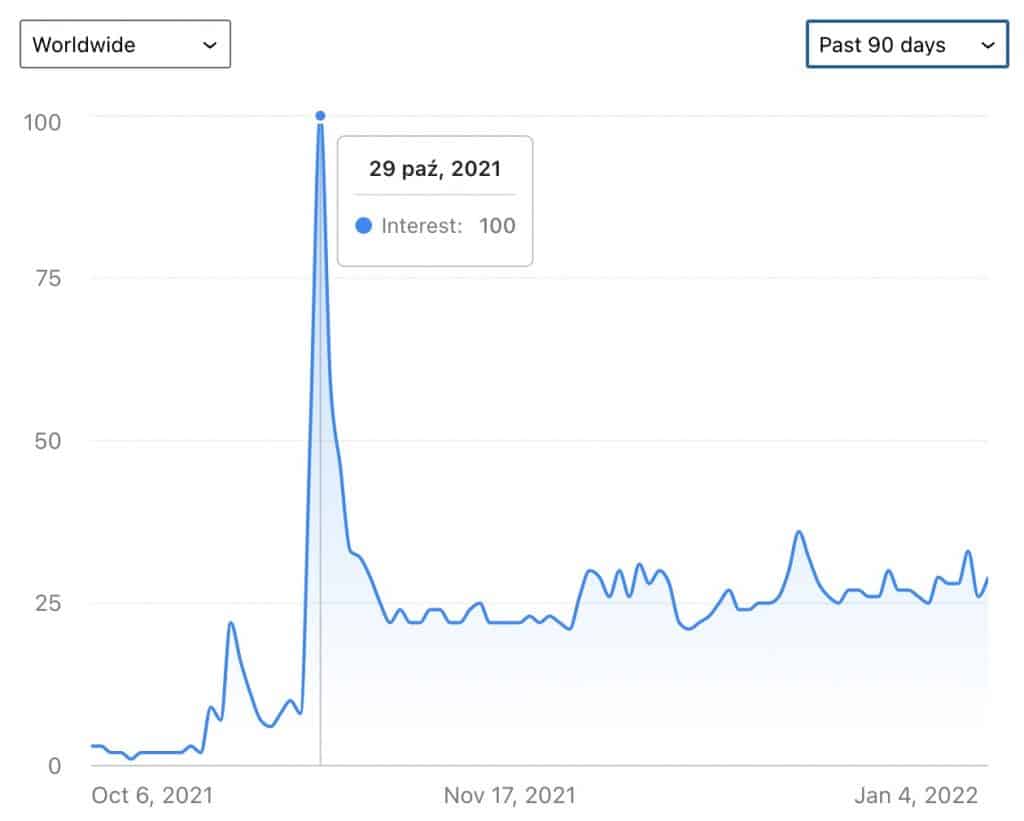
Why the sudden turnaround and rush to metaverse?
The year 2020 and the pandemic enslaving the world has clearly forced us to make a lot of changes and move our operations to an online environment, the Internet. "We've jumped five years ahead in our remote working capabilities at one point," said Verizon CEO Hand Vestberg at CES 2021.
The introduction of pandemic restrictions has momentarily accelerated the development of online technologies, with as many as: 93% of global users admitted that it is definitely our future, 76% of respondents confirmed that their daily lives are already heavily dependent on these technologies, and more than half, 52%, even declared that their level of happiness depends on technology, internet access and social media.
META's virtual domain is set to become an all-encompassing space where commerce, education, entertainment, communities, wellness and work will become accessible in a unified digital world. For those spending time online, this next zone, with new opportunities, could prove to be a new direction for entrepreneurs, authors, bloggers or influencers. Let's consider what the metaverse is today and what it could become. What new opportunities could it bring? Why are global brands already paying such strong attention to this theme?
Let's start with the genesis of the Metaverse thread itself....
Note that this is not new! Such virtual platforms have been in the making for nearly two decades. VSide(2004), Twinity(2008), IMVU(2004)or the most famous Second Life (2003) are virtual places where, as in metaverse, we are avatars and meet other people in a 3D world - against the backdrop of a city, a tropical island or a space station.
Interestingly, there have also been specialist solutions for over a decade dedicated to the events industry. Mention, for example, the metaverses available in our Avatarlandzie: Virbela (2012), VirtwayEvents (2014), MootUp (2010) or Virtuworx (2010). Users enter these worlds after installing a dedicated app or simply from a web browser. Avatars can chat with each other, participate in conferences, trade fairs and training sessions that take place in them, and during company integration, they can play a game of toss, go motorboating, play a football match, dance in a music club or have fun in an escape-room. These are already powerful and versatile tools for organising online events today, and on the wave of announcements of big brands entering the subject - the subject is becoming increasingly popular.
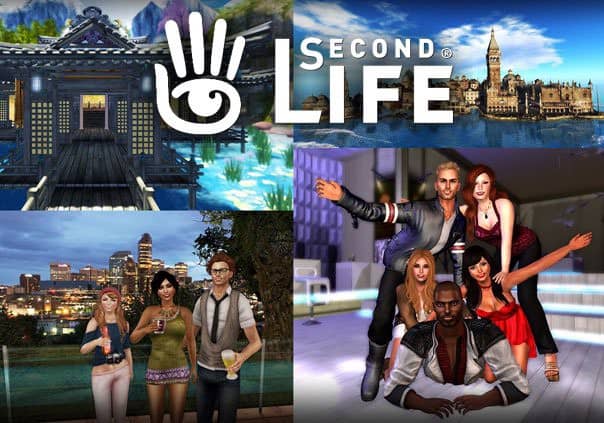
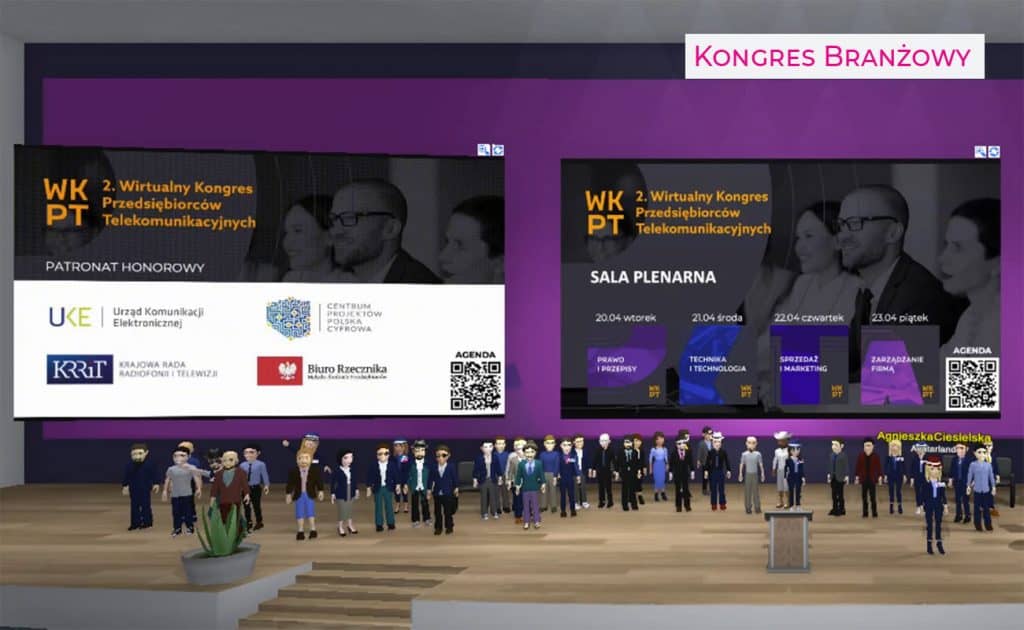
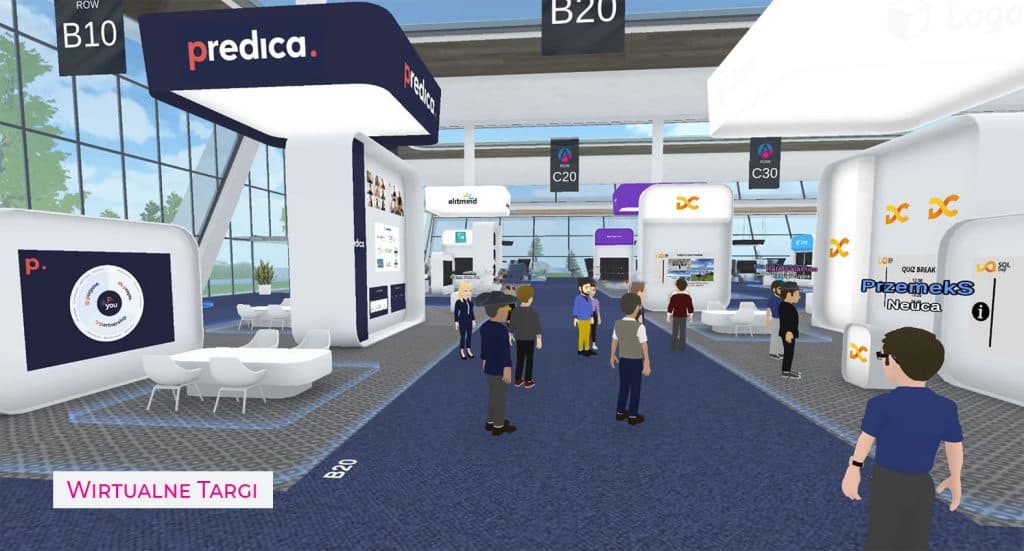
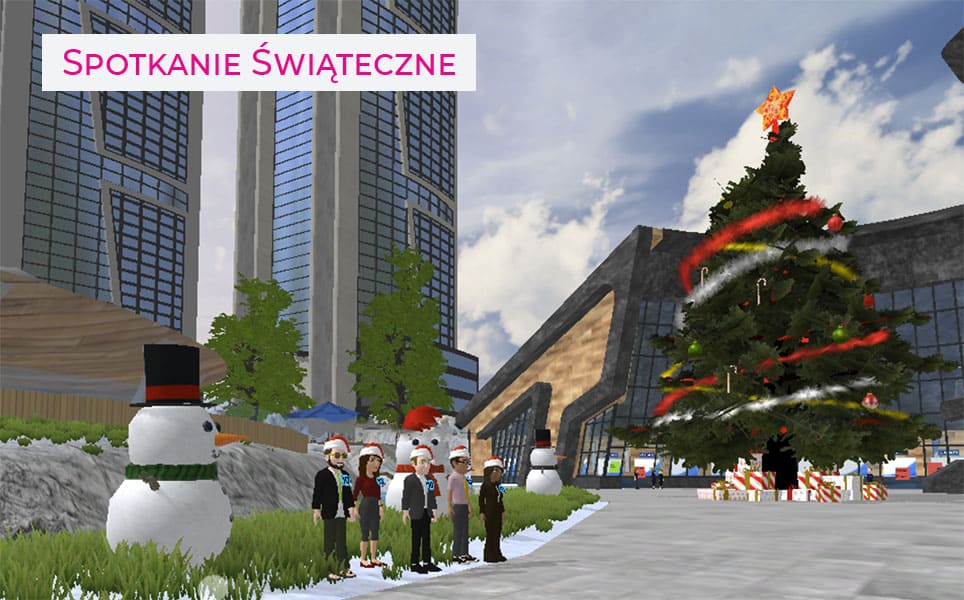
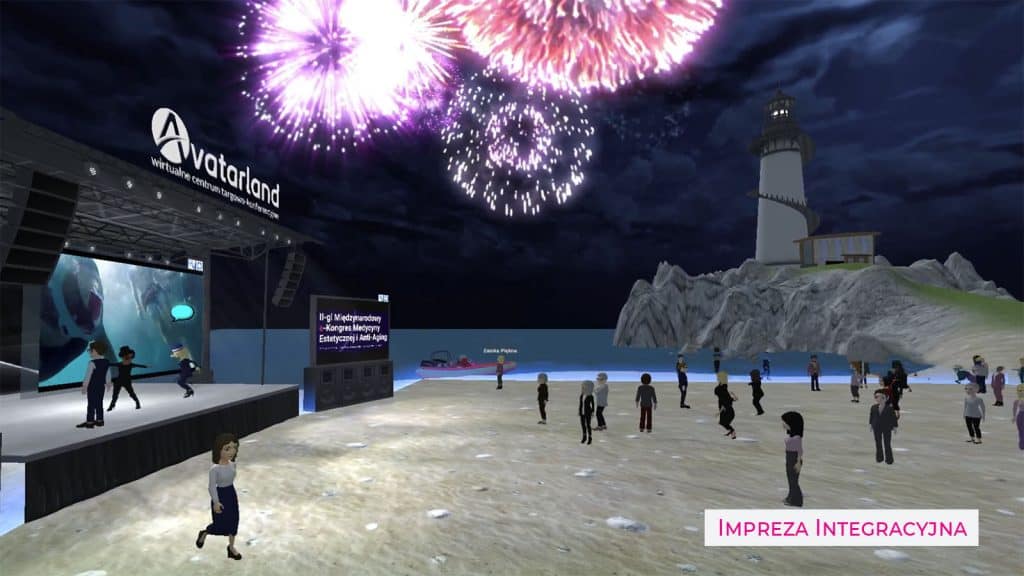
The world that Zuckenberg's company is creating is no longer just an online conference platform. It is intended to have even greater possibilities and is to lead in its power to the creation of a single space for the communication of services, services and technologies together in a parallel world combining reality and virtual space. To enter the digital realm you will need: Internet, a computer or smartphone, and optional VR/AR goggles or glasses.
Why do we need a new online virtual world?
This is where we get to the heart of the matter. Why do we need a second world of the Internet in 3D? Obviously, it's about a new industry and another milestone in the development of communications and the internet. It's business as usual - a new space to be developed and filled. We will come here for new experiences, for new experiences, for a new dimension of spending time with friends. A little for the trend, the change and to give direction to the development of the modern world, and a little out of curiosity or also out of necessity - if we get employed by a company based in the metaverse.
Sounds unrealistic? Not at all, such companies already exist, and the well-known company Deloitte, for example, already has its training centre in the metaverse.
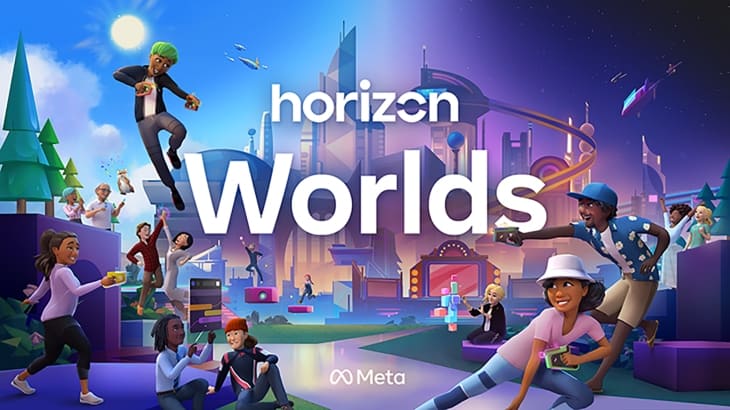
The original design by Meta (formerly Facebook) is Horizon Worlds - here teams of avatars meet in the middle of a 3D city, with the use of Oculus VR goggles being essential. There, they learn to high-five and grab virtual bottles in their hands. With the graphics - there is no frenzy so far - and in fact there is a complete disappointment so far, as it is very different from the visuals presented in the trailers and advertising spots.
Much more mature graphics are already available on 'metaverse events' platforms, such as the worlds available in Avataraland. Horizon Worlds, for the time being, is a slight false start, a tool for testers and those most curious about technology fanatics. In any case, once there is something to see there, such a city will also be filled with services, companies, attractions and probably everyone will be fighting for the viewer's attention. This can and will certainly be a very interesting experience in the future.
Further digitisation of our lives and online encounters
Zuckerberg announces that more than one billion users will exist in the new world within a decade. Is this realistic? Experts say yes, as the next stage in the digitalisation of our lives. We can reach this ceiling of interest quickly, especially in a world where pandemonium still reigns and the development of technology for online events is growing at a rapid pace.
Today we are no longer surprised by online banks, ordering food to your door from your mobile phone, or finding a rental car nearby and starting it with your phone without a key. We order almost everything from a fridge to mascara online. As we spend more and more time on the internet and in online services, it will probably become increasingly difficult to give that up over time - so the way forward for services in the online world seems natural.
So why shouldn't such technology jump into the world of events, festivals or concerts? There are already such attempts: have you seen Travis Scott concert on the Fortinite platform in 2020? Also, the well-known and huge Tomorrowland festival, cancelled due to the pandemic, was held in a virtual amphitheatre making an incredible impression.
Will we one day live in a metaverse?
Taking it a step further, creating your own virtual home, space or workspace would be a dream come true for any celebrity or multinational company. Virtual artists such as Shanghai Henian's Luo Tianyi are worth many billions of dollars. In a virtual space, your best friend could be an AI bot such as Kuki, and non-exchangeable tokens (so-called NFTs) have already revolutionised the concept of digital ownership. Something can be worth a great deal without traditional tangible value - by definition even when it does not physically exist.
The next step is the digitisation of culture and art. Auction houses Chrisie's & Sotheby's are auctioning masterpieces in digital auctions and buyers confirm by their attendance and activity that they are no longer reticent to bid online. Board and supervisory board meetings can already be held online too, and voting can be done with the help of a mobile app. Are we already living in a metaverse? - Asks the New York Times magazine in a July 2021 article. People with cryptocurrency think they are just building it there. Game'ers maintain that they've already been playing in it for years. Art people - they're just getting in.
And event people? We still feel the resistance of event agencies when it comes to 'digital' but it is getting less and less - clients want to try these experiences and are increasingly sending briefs for the perfect event in the virtual world. Today, the competencies of a modern event manager must include the skills and experience to create events online, and soon also those in the metaverse.
The world of film, media and games also wants to make its mark on the metaverse
By 2025, the games market could become a $300 billion industry, according to GlobalData. This is three times the global film industry record of $101 billion in 2019. It is rumoured that gaming metaverse plans to replace TV and even Netflix for the younger generation. The UK-based interactive TV broadcaster is already offering new content to watch on Fortnite Creative, recreating the popular game show The Void. Those interested in new concepts for developing 3D entertainment are also referred to the series "Upload" available in Amazon's Prime library. Netflix has already created an interactive world of the series "Stranger Things' in Roblox in June this year, which resulted in a fruitful attempt to combine the worlds of streaming and gaming. Metaversum's new medium is intended to be a mix of entertainment and interactivity. And I look forward to this change with eager anticipation.
Report "Into the Metaverse"
According. to. the. report: "Into the Metaverse"prepared by Wunderman Thompson, we already know the new categories of these virtual worlds are: MetaLives, MetaSpaces, MetaBusiness and MetaSocieties. It is worth understanding each of these in order to encompass the size of our new Internet - the Metaverse.
Dictionary of metaverse terms and the scale of new business
MetaLives - is the extent to which a consumer approaches a shelf with a view to shopping in, for example, a large shopping centre. The brands' products are to have a counterpart through Metaversum's integration with the world of VR and augmented reality - Augmented Reality, together they are called MixReality. Fashion house The Fabricant has already announced collaborations in this area with brands Adidas, Puma or Tommy Hilfiger. So when we are in a shoe shop - will we be able to see the shoes from all sides without leaving the house, choose the size, colour, style, texture? Absolutely. Game producers will allow us to use the wardrobe of the characters we play to buy them additional clothes or accessories.
In MetaLives we may find even greater sales potential than we suppose. In it, we can create new markets over time, and every industry can have a counterpart to its association, chamber of commerce, confederation or enthusiasts sharing the same interests. Creating these worlds is again - new spaces for 3D designers and those who want to be on trend with modernity. They are the ones who will want to have their world in the virtual world of global business. There are already examples of this:
- joint collection Balenciaga and Epic Games: allows you to purchase four clothing collections for your characters in the Fortinite game from the virtual shop.
- Ralph Lauren has released a 50-piece digital clothing collection in August 2021, available to buy on social media app Zepeto.
- Luxury car manufacturers including Maserati, Aston Martin and Tesla have launched virtual models of their vehicles in Tencent's Game for Peace.
- Singer Dorota "Doda" Rabczewska has announced that she scanned her body into 400 pieces to sell at the NFT. The fan-owners of each part of her virtual body will trade them in the form of non-exchangeable NFT tokens. (J what an idea!)
- The sandwich at McDonalds has also already metrialised in the virtual world. McRib or the virtual rib You can Google it, but not taste it. After all, such activities are not about taste, but about branding and brand image.
Meta societies - is the equivalent of social media, where we create images, can communicate, share our interests and our daily lives. Such Facebook or Insta-Stories. It is a world where influencers, celebrities and even politicians will swarm, where everyone will be in the skin of a MetaHuman (avatar). Digital platforms are becoming places where users go to strengthen friendships or meet new people.
Video games in particular are becoming a place to meet online. Xbox in May 2021 explored this phenomenon and nearly 76% Brits confirmed that meeting online in games, or virtual platforms, is a place for casual networking, and as many as 84% Chinese believe that such technology deepens relationships with friends. Fortnite, Sea of Thieves, No Man's Sky are just some examples of communities that reach millions to spend time together. Don't you think this world has gone a little weird?
MetaSpaces - is the area of virtual spaces. This is where concerts, exhibitions, fairs for intangible goods or traditional conferences and virtual teambuildings will be hosted. Impossible? Not at all; in 1.5 years, we have organised almost 50 events in the virtual conference centre, and that on just one platform! Moving forward, the first virtual fashion show has already taken place and it was thanks to the IMVU virtual clothing shop. The IMVU virtual shop features 50 million products created by more than 200,000 creators. (Fourteen billion in credits, or $14 million, exchanges over 27 million transactions every month).
In MetaSpaces, there will be equivalents of natural and architectural wonders and directions that not everyone can fly to. Seoul has already announced that it will create its virtual city in the metaverse.
A study by Wunderman Thompson shows that consumers are able to pay as much as $9,000 for a digital work of art, $2,900 for a branded handbag and as much as $75,000 for a virtual home. Has this world gone mad!
Organisation of events in the metaverse
Travis Scott's groundbreaking April 2020 project set in Fortnite attracted 12.3 million viewers. According to Epic Games, this was a world record for event attendance. In the following days, the concert footage was viewed by a further 27.7 million unique viewers. In November 2020, Lil Nas X held a concert on Roblox with 33 million viewers, and in August 2021 Ariana Grande headlined the Rift tour where she welcomed 1 million online viewers at her first concert.
March's 2021, South by South West (SXSW) conference was held in a created - designed 3D world in Austin. Accessible from the internet and VR goggles, the virtual world was operated entirely by virtual avatars. More than 100,000 spectators were able to manage their navigation of the platform between films, live screenings, rooftop happy-hours, and there were theatre performances, speeches and workshop sessions in the programme. Of the attractions, there were even those impossible to do in the live world: drone tours to see a bird's-eye view of such an event.
And all this is just the beginning of what lies ahead....
METAWERS - the next version of the consumer internet and the virtual sharing of what's around us. Business giants are rubbing their hands. Investment funds are massively backing the financing of the development of this technology. Where will this take us? Let's see... One final thought: when we were kids, we used to meet on the fence outside the block or on the football pitch. Nowadays, kids meet in Minecraft, Roblox, and in a short while they will start to do so in Horizon Worlds, among others. We clearly need this - such are the times... The development of our civilisation cannot be stopped by any force, and the creativity of virtual technology developers is the driving force of the future, which is already slowly beginning to overtake our ideas of the future from a dozen years ago. We are living in very interesting times!
In the New Year 2022, we wish you nothing but lucrative metaverse projects and more!
Greetings
Agnieszka